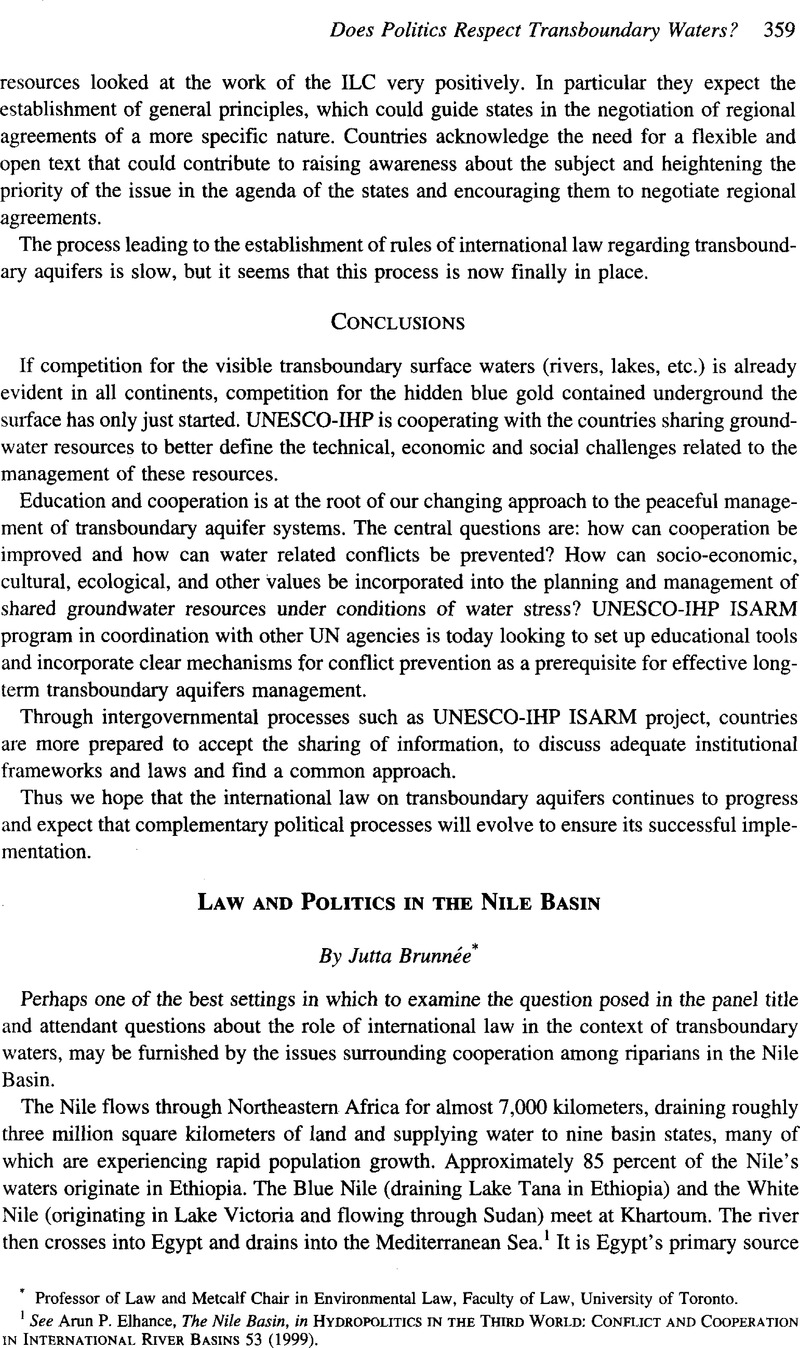No CrossRef data available.
Published online by Cambridge University Press: 28 February 2017

1 See Elhance, Arun P. The Nile Basin, in Hydropolitics in the Third World: Conflict and Cooperation in International River Basins 53 (1999)Google Scholar.
2 See Schwabach, Aaron, The United Nations Convention on the Law of Non-Navigational Uses of International Watercourses, Customary International Law, and the Interests of Developing Upper Riparians, 33 Texas Int’l L. J. 257, 263 (1998)Google Scholar.
3 Experts speak of water scarcity when less than 1,000 cubic meters of renewable freshwater are available per person per year. See Falkenmark, Malin, Rapid Population Growth and Water Scarcity: The Predicament of Tomorrow’s Africa, 16 Population & Dev. Rev. 81, 84 (1990)CrossRefGoogle Scholar.
4 See Laki, Sam L. Management of Water Resources in the Nile Basin, 5 Int’L J Sustainable Dev. & World Ecology 288, 289 (1998)CrossRefGoogle Scholar.
5 See Swain, Ashok, Ethiopia, the Sudan, and Egypt: The Nile River Dispute, 35 J. Mod. Afr. Stud. 675 (1997)CrossRefGoogle Scholar.
6 Agreement Between the Republic of the Sudan and the United Arab Republic for the Full Utilization of the Nile Waters, 8 November 1959, 453 UNTS 6519 51, (entered into force Dec. 12 1959).
7 Brunnée, Jutta and Toope, Stephen J. The Changing Nile Basin Regime: Does Law Matter?, 43 HILJ 105 (2002)Google Scholar.
8 See Fuller, Lon L., The Morality of Law 46-91, 155 (rev. ed. 1969)Google Scholar.
9 For an extended discussion, see Brunnée, Jutta & Toope, Stephen J. International Law and Constructivism: Elements of an Interactional Theory of International Law, 39 Col. J. Transnat’l L. 19, 43-64 (2000)Google Scholar.
10 For an overview, see e.g., Adler, Emanuel, Constructivism in International Relations, in Handbook of International Relations 95 (Carlsnaess, Walter, Risse, Thomas and Simmons, Beth, eds., 2002)CrossRefGoogle Scholar.
11 See Wendt, Alexander, Collective Identity Formation and the International State, 88:2 Am. Pol. Sci. Rev. 384, 389 (1994)CrossRefGoogle Scholar (speaking generally of social norms).
12 See also LeRoy, Pamela, Troubled Waters: Population and Water Scarcity, 6 Colo. J. Int’l Envtl L. & Poly 299, at n. 75 (1995)Google Scholar.
13 For an overview, see Brannée, Jutta & Toope, Stephen J. Environmental Security and Freshwater Resources: Ecosystem Regime Building, 91 AJIL 26, 40-1, 60-63 (1997)CrossRefGoogle Scholar.
14 For a detailed account of this evolution see Brunnée & Toope, supra, note 7, at 131-144.
15 See TECCONILE, Nile River Basin Action Plan (1995), at VII. Tecconile stands for “Technical Cooperation for the Promotion of the Development and Environmental Protection of the Nile Basin.”
16 See Nile Basin Initiative, NBI Background-Objectives, <http://www.nilebasin.org/index.php?option=com_content&task=view&id=13&Itemid=42> (last visited June 6, 2008).
17 See Ethiopia, Sudan, Egypt to join hands in water project, Xinhua News Agency, Sept. 16, 1999 (file with the author).
18 U.N. Convention on the Law of Non-Navigational Uses of International Watercourses, U.N. Doc. A/RES/51/229 (May 21, 1997), reprinted in 37 I.L.M. 700 (1998).
19 See Brunnée & Toope, supra, note 7, at 151-152.
20 See e.g. Salman, Salman M. A., The Helsinki Rules, The UN Watercourses Convention and the Berlin Rules: Perspectives on International Water Law, 23 Int’L J. Water Resources Dev. 625, 634 (2007)CrossRefGoogle Scholar.
21 ILA, Report of the Seventy-First Conference - Berlin 334, at 339 (London: ILA, 2004).
22 Id., at 345 (Article 3.14).
23 Id., at 361 (Article 12.1).
24 Id., at 362.
25 Salman, supra note 20, at 636.
26 See, e.g., Nile Basin Initiative, Nile Technical Advisory Committee (Nile TAC) Meeting Held in Entebbe, <http://www.nilebasm.org/index.php?option=com_content&task=view&id=59&Itemid=113> (last visited Mar. 10, 2008).
27 Nile Basin Initiative, Fourteen Institutions from the Nile Basin Countries to Receive $50,000 each from the NBI, <http://www.nilebasin.org/index.php?option=com_content&task=view&id=71&Itemid=113> (last visited Mar. 10, 2008).
28 Nile Basin Initiative, Nile Commission to Succeed Nile Basin Initiative, 21 May 2007, <http://cbsi.nilebasin.org/index.php?option=com_content&task=view&id=19&Itemid=28> (last visited Mar. 10, 2008).
29 Edwin Musoni and Agencies, Africa: Rift Widens Over Nile Basin Pact as Egypt, Sudan Remain Reluctant, The New Times (Kigali), Feb. 29, 2008, <http://allafrica.com/stories/200802290213.html>.
30 Id.
31 Id.
32 Joseph Ngome, Clause Holds Key to New Nile Treaty, The Nation (Nairobi), Mar. 28, 2008, <http://allafrica.-com/stories/200803280008.html>.